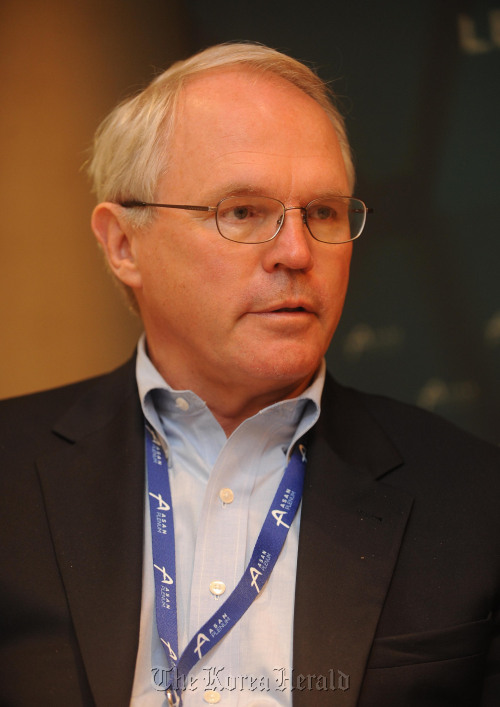N.K. reneging on U.S. deal suggests disarray at top: Hill
By Korea HeraldPublished : April 25, 2012 - 19:45
Former U.S. nuke envoy says North is relic of China’s past, not asset for its future
North Korea’s rocket launch in violation of a breakthrough deal in February with the U.S. is an indication of “deeper problems” within the leadership of the communist state, a former chief U.S. nuclear negotiator said Wednesday.
“I think it does suggest some disarray at the top or some lack of clarity on who does what in North Korea,” Christopher Hill, a former U.S. assistant secretary of state for East Asia, told The Korea Herald.
“There was no misunderstanding on the agreement and if there was misunderstanding, it was not between America and North Koreans. It was between North Koreans and other North Koreans ... a lot to be worried about today.”
North Korea’s rocket launch in violation of a breakthrough deal in February with the U.S. is an indication of “deeper problems” within the leadership of the communist state, a former chief U.S. nuclear negotiator said Wednesday.
“I think it does suggest some disarray at the top or some lack of clarity on who does what in North Korea,” Christopher Hill, a former U.S. assistant secretary of state for East Asia, told The Korea Herald.
“There was no misunderstanding on the agreement and if there was misunderstanding, it was not between America and North Koreans. It was between North Koreans and other North Koreans ... a lot to be worried about today.”

Hill, now dean of the Josef Korbel School of International Studies at the University of Denver, is in Seoul to attend the 2012 Asan Plenum, a three-day international forum on global challenges that kicked off on Wednesday. The annual forum was organized by Asan Institute for Policy Studies, a local think tank.
Hill was referring to the deal Washington and Pyongyang reached on Feb. 29 as a pre-step for the resumption of the six-party denuclearization talks that involve the two Koreas, the U.S., Russia, Japan and China.
Under it, the North was to temporarily suspend uranium enrichment at its main nuclear complex in Yongbyon and halt missile and nuclear tests in exchange for 240,000 tons of “nutritional assistance.”
The North broke the deal earlier this month by launching a long-range rocket. The North claimed it fired off a research satellite but is widely suspected of carrying out a disguised ballistic missile test.
Regarding the argument that China still views the impoverished state as a strategic buffer zone against American power, Hill said that North Korea is a “relict of China’s past, not an asset for its future.”
“I don’t think a country whose only export is now refugees is particularly an effective buffer for China. I think China and all of us should look for buffers in the form of good neighbors,” said Hill.
“I would hope that in the context of this very difficult time that ... China will look to really be a close contact with the ROK (the Republic of Korea). Sooner or later, China and the ROK will have a common border.”
As for the skepticism over the effectiveness of the multilateral denuclearization framework, Hill said that the problem was not the mechanism, but North Korea itself.
“I don’t think we have a problem there, we have a problem with the behavior of North Korea,” he said.
“I think the six-party process should be thought as a platform on which we can do a lot of things. One of the activities is to put more pressure on China (to use its influence over Pyongyang).”
Underscoring China’s role in persuading the North to renounce nuclear ambitions, he said Beijing still should do more.
“I think China needs to do a lot more in terms of making sure that it does not give conflicting signals to the North Koreans. Today, I think there are some conflicting signals,” he said.
China has recently made unusual moves against the North in an apparent display of discontent over its provocative actions including the launching of a long-range rocket. Without any serious opposition, it also agreed last week to strongly condemn the North in a U.N. Security Council presidential statement.
By Song Sang-ho (sshluck@heraldcorp.com)
-
Articles by Korea Herald












![[Today’s K-pop] BTS pop-up event to come to Seoul](http://res.heraldm.com/phpwas/restmb_idxmake.php?idx=644&simg=/content/image/2024/04/17/20240417050734_0.jpg&u=)





![[KH Explains] Hyundai's full hybrid edge to pay off amid slow transition to pure EVs](http://res.heraldm.com/phpwas/restmb_idxmake.php?idx=652&simg=/content/image/2024/04/18/20240418050645_0.jpg&u=20240418181020)

![[Today’s K-pop] Zico drops snippet of collaboration with Jennie](http://res.heraldm.com/phpwas/restmb_idxmake.php?idx=642&simg=/content/image/2024/04/18/20240418050702_0.jpg&u=)